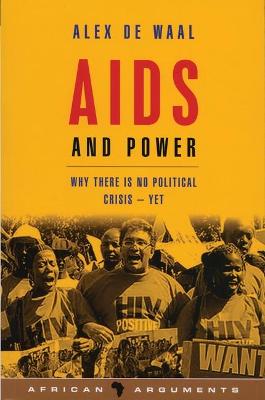African Arguments
2 total works
One in six adults in sub-Saharan Africa will die in their prime of AIDS. It is a stunning cataclysm, plunging life expectancy to pre-modern levels and orphaning millions of children. Yet political trauma does not grip Africa. People living with AIDS are not rioting in the streets or overthrowing governments. In fact, democratic governance is spreading. Contrary to fearful predictions, the social fabric is not being ripped apart by bands of unsocialized orphan children.
AIDS and Power explains why social and political life in Africa goes on in a remarkably normal way, and how political leaders have successfully managed the AIDS epidemic so as to overcome any threats to their power. Partly because of pervasive denial, AIDS is not a political priority for electorates, and therefore not for democratic leaders either. AIDS activists have not directly challenged the political order, instead using international networks to promote a rights-based approach to tackling the epidemic. African political systems have proven resilient in the face of AIDS's stresses, and rulers have learned to co-opt international AIDS efforts to their own political ends.
In contrast with these successes, African governments and international agencies have a sorry record of tackling the epidemic itself. AIDS and Power concludes without political incentives for HIV prevention, this failure will persist.
AIDS and Power explains why social and political life in Africa goes on in a remarkably normal way, and how political leaders have successfully managed the AIDS epidemic so as to overcome any threats to their power. Partly because of pervasive denial, AIDS is not a political priority for electorates, and therefore not for democratic leaders either. AIDS activists have not directly challenged the political order, instead using international networks to promote a rights-based approach to tackling the epidemic. African political systems have proven resilient in the face of AIDS's stresses, and rulers have learned to co-opt international AIDS efforts to their own political ends.
In contrast with these successes, African governments and international agencies have a sorry record of tackling the epidemic itself. AIDS and Power concludes without political incentives for HIV prevention, this failure will persist.
Sudan's westernmost region, Darfur, sprang from oblivion into sudden notoriety early in 2004, when a war of hideous proportions unleashed what the United Nations called 'the world's worst humanitarian crisis' and the United States labelled 'genocide.' For the last two years, the conflict has been simplified to pictures of immense sprawling refugee camps and lurid accounts of 'Arabs' murdering 'Africans.'
Behind these images lies a complex and fascinating story of a unique and remote region of Africa, home to Muslim peoples with a unique history. In the 20th century, Darfur became synonymous with poverty and neglect, culminating in famine and a series of undeclared and unacknowledged wars in the 1980s and '90s. This book details the history of Darfur, its conflicts, and the designs on the region by the governments in Khartoum and Tripoli.
Much of the story of the war in Darfur has remained untold until now. This book investigates the identity of the infamous 'Janjawiid' militia, tracing its origins, organization and ideology. It inquires into the nature of the insurrection launched by two rebel groups, the radical Sudan Liberation Army and the more Islamist-oriented Justice and Equality Movement. It charts the unfolding crisis and the confused international response, including the African Union's first major venture into peacemaking and peacekeeping. The book concludes by asking what the future holds in store for Darfur.
Behind these images lies a complex and fascinating story of a unique and remote region of Africa, home to Muslim peoples with a unique history. In the 20th century, Darfur became synonymous with poverty and neglect, culminating in famine and a series of undeclared and unacknowledged wars in the 1980s and '90s. This book details the history of Darfur, its conflicts, and the designs on the region by the governments in Khartoum and Tripoli.
Much of the story of the war in Darfur has remained untold until now. This book investigates the identity of the infamous 'Janjawiid' militia, tracing its origins, organization and ideology. It inquires into the nature of the insurrection launched by two rebel groups, the radical Sudan Liberation Army and the more Islamist-oriented Justice and Equality Movement. It charts the unfolding crisis and the confused international response, including the African Union's first major venture into peacemaking and peacekeeping. The book concludes by asking what the future holds in store for Darfur.

